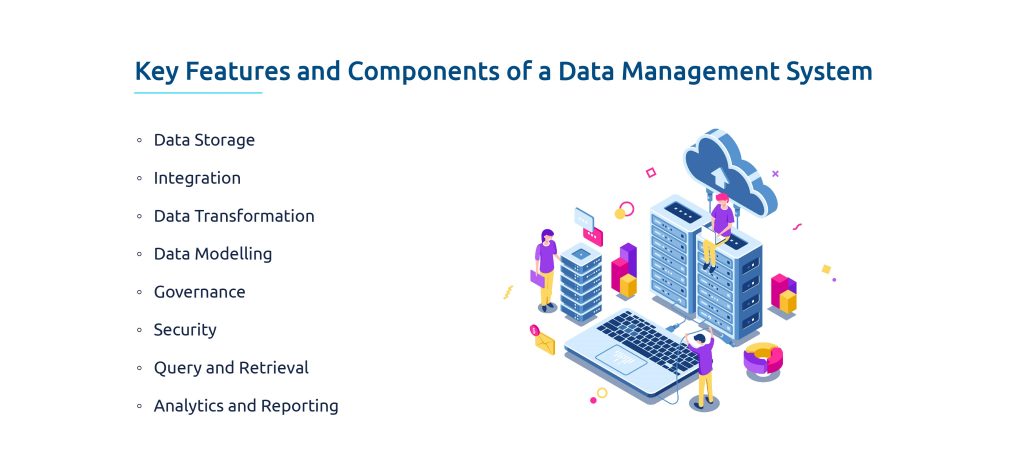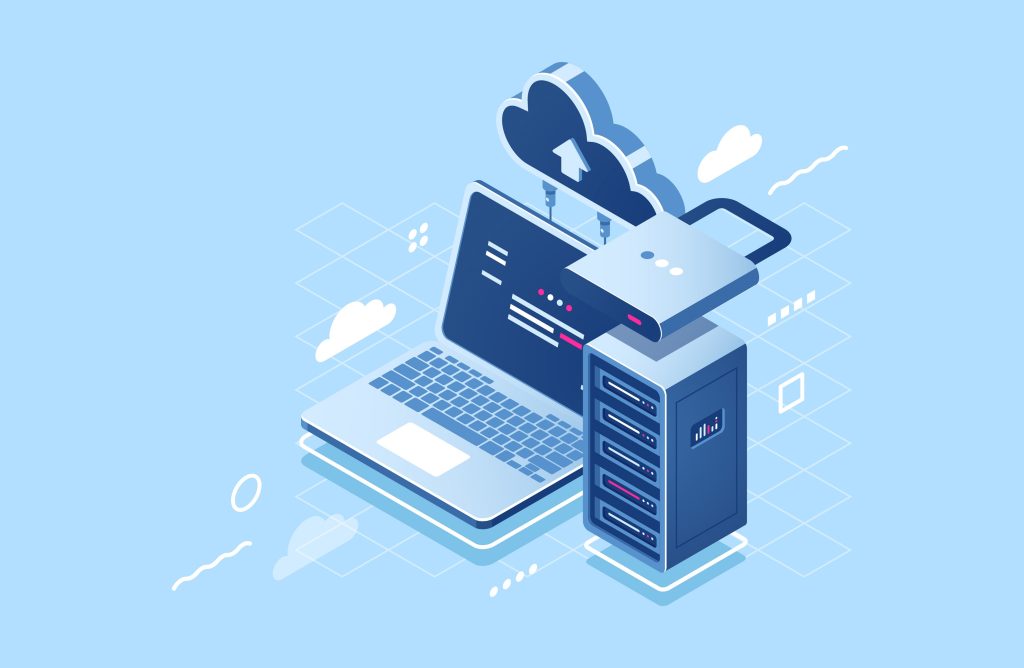BLOG
Database Management System Unveiled: Choosing the Right Solution for Your Data Needs
PART 1
What is a database management system?
The database management system is nothing but a data-keeping system. It is a software application or platform designed to store, organize, retrieve, and manage data efficiently and effectively.
It provides a structured framework for capturing, processing and maintaining data ensuring its integrity, security, and accessibility.
Businesses can handle huge volumes of data and derive meaningful insights with the help of data management systems.
Database Management Systems provide various functionalities like data storage, data integration, data cleansing, data transformation, data modelling, data governance, and data security.

Key Features and Components of a Database Management System:
Data Storage: The enables mechanism to store and manage several types of data, like structured, semi-structured, and unstructured data in a database or data warehouse.
Integration: The system allows you to integrate data from various sources and methods. It ensures consistency and coherence across the organization.
Data Transformation: With database management systems you can perform data transformation, data manipulation, data cleansing, data enrichment, data aggregation, and data normalization to ensure data quality and usability.
Data Modelling: It enables and supports managing and creating data models that define the structure, relationships, and constraints of the data stored in the system.
Governance: The system facilitates data governance practices, including data lineage, data auditing, data privacy, and compliance with regulatory practices.
Security: Database management systems ensure optimum data security through access controls, encryption, authentication, and data backup and recovery mechanism.
Query and Retrieval: The system provides tools and capabilities to query and retrieve data efficiently, so you can access the required information to analyse and make informed decisions.
Analytics and Reporting: It has in-built data analytics and reporting features or integration with external analytics tools to derive insights and generate reports based on the stored data.

What are the different types of database management systems?
There are several types of database management systems, each designed to handle specific data storage and retrieval requirements. The main types include:
Relational Database Management System:
This is the most common type of Database Management System, characterized by using tables to store data and relationships between them. RDBMSs adhere to the relational model, with SQL (Structured Query Language) being the standard language for managing and querying data. Examples include Oracle Database, MySQL, Microsoft SQL Server, and PostgreSQL.
Object-Oriented Database Management Systems (OODBMS):
They are designed to store and manage complex, interconnected objects rather than simple tables. They support object-oriented programming concepts such as inheritance and encapsulation. OODBMSs are suitable for applications that work with complex data structures and object-oriented languages. Examples include ObjectDB and Versant.
Hierarchical Database Management System (HDBMS):
This system organizes data in a tree-like structure with parent-child relationships. This type of DBMS is used for managing hierarchical data models. Examples include IBM’s Information Management System (IMS) and Windows Registry.
Network Database Management System (NDBMS):
NDBMSs are like HDBMSs but allow more flexible relationships between data elements. Data in an NDBMS is organized using a network model, where records can have multiple owners and relationships can be established between any two records.
NoSQL Database Management System:
NoSQL (Not only SQL) is designed to handle large-scale, distributed data with high velocity and variety. They are non-relational and offer flexible schema designs. NoSQL databases are commonly used for web applications, real-time analytics, and handling unstructured data. Examples include MongoDB, Cassandra, Couchbase, and Redis.
NewSQL Data Management System:
NewSQL DBMSs aim to combine the benefits of traditional SQL databases (ACID compliance, strong consistency) with the scalability and performance of NoSQL databases. They provide improved horizontal scalability while maintaining the relational data model. Examples include CockroachDB, Google Spanner, and VoltDB.
These are some of the main types of data management systems, each suited for different data models, scalability requirements, and application needs. Choosing the right DBMS depends on factors such as data structure, performance requirements, scalability, and specific functionalities required for the application or use case at hand.
What are the advantages of a Database Management System
Database Management Systems offer several advantages that make them essential tools for storing, managing, and retrieving data efficiently. Here are some key advantages of using a DBMS:
Centralization:
A Database Management System provides a centralized repository for storing data, eliminating the need for multiple data sources and redundant data storage. This centralization ensures data consistency and reduces data redundancy, leading to better data integrity and accuracy.
Sharing and Collaboration:
Database Management Systems allow multiple users to access and share data simultaneously. It provides controlled access through user authentication and authorization, ensuring data security and privacy. Collaboration among users and departments is enhanced as they can access and update the same data in a controlled manner.
Integrity and Security:
DBMS offers mechanisms for maintaining data integrity, enforcing data constraints, and ensuring data consistency. It provides built-in security features to control access, implement user roles, and protect sensitive data from unauthorized access.
Data Consistency and Standardization:
Database Management Systems enforce data consistency by adhering to predefined data models, constraints, and relationships. It helps maintain data integrity and ensures that data conforms to predefined rules and standards.
Efficient Data Retrieval:
It allows efficient and quick data retrieval through query optimization techniques, indexing, and caching mechanisms. You can retrieve specific data subsets based on your requirements, enabling faster decision-making and analysis.
Data Scalability:
It provides scalability options to handle growing data volumes. It allows for easy expansion of the database by adding more storage space, accommodating increased data requirements, and supporting larger user bases without sacrificing performance.
Backup and Recovery:
A Database Management System offers built-in backup and recovery mechanisms to protect data from accidental loss or system failures. It allows for regular backups, point-in-time recovery, and data restoration to ensure data availability and business continuity.
Data Independence:
It provides data independence by separating the logical and physical aspects of data management. This allows changes in the physical storage or organization of data without affecting the logical structure and application programs.
Integration and Interoperability:
Database Management Systems support data integration by providing tools and mechanisms for importing, exporting, and integrating data from multiple sources. It facilitates interoperability between different systems and applications, allowing seamless data exchange and integration.
Improved Data Analysis and Decision-making:
It provides capabilities for data analysis, reporting, and business intelligence. People can perform complex queries, generate reports, and gain insights from the data, leading to better decision-making and strategic planning.
Relational Vs Non-Relational Database
Relational databases and non-relational databases (often referred to as NoSQL databases) are two different approaches to storing and managing data. Here’s a comparison between the two:
Relational Databases:
Structure: Relational databases use a tabular structure with rows and columns to organize and store data. Data is organized into tables, and relationships between tables are established using primary and foreign keys.
Schema: They have a predefined schema that defines the data’s structure, data types, and relationships. Changes to the schema require careful planning and often involve modifying existing data.
Data Integrity: Relational databases enforce data integrity using constraints, such as unique keys, foreign keys, and data validation rules. ACID (Atomicity, Consistency, Isolation, Durability) properties ensure data consistency and transactional integrity.
Query Language: They use SQL (Structured Query Language) for data retrieval, manipulation, and management. SQL provides powerful querying capabilities for complex data operations.
Scalability: Relational databases scale vertically, meaning they are typically scaled by increasing the hardware resources of a single server. However, scaling horizontally across multiple servers can be challenging and requires additional considerations.
Use Cases: Relational databases are suitable for applications with structured data and complex relationships, such as financial systems, e-commerce platforms, and data-driven applications with predefined schemas.

Non-Relational Databases (NoSQL):
Structure: Non-relational databases employ various data models, such as key-value, document, columnar, and graph, to store and organize data. These models offer flexibility and can handle unstructured and semi-structured data.
Schema: NoSQL databases are schema-less or have a flexible schema, allowing for dynamic and evolving data structures. Data can be added without a predefined format or modifications to existing data.
Data Integrity: They may sacrifice some data integrity features, such as ACID properties, in favour of scalability and performance. They often adopt BASE (Basically Available, Soft state, eventually consistent) properties for distributed systems.
Query Language: NoSQL databases may use a variety of query languages, including SQL-like languages and document-oriented query languages specific to the data model. Some NoSQL databases also provide APIs for data access and manipulation.
Scalability: They excel in horizontal scalability, allowing them to handle large volumes of data and high traffic loads across multiple servers or clusters. They are designed for distributed environments and can scale dynamically.
Use Cases: NoSQL databases are suitable for applications with unstructured or rapidly changing data, real-time analytics, content management systems, and applications that require high scalability and flexibility.
Choosing between a relational database and a non-relational database depends on the specific requirements of your application, the nature of your data, scalability needs, and development flexibility.
In part 2 of this series, we discuss more about SQL and NoSQL database management systems and how they are going to help you in managing data.
Related Topics
Trending Topics
Want to build Super app for your business?



